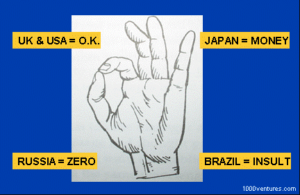The Problem with Bible Translations: Your Culture
 Anyone who reads the Bible today faces an unavoidable fact—Scripture was originally written in and for a culture different than our own culture. This makes the Bible difficult to understand.
Anyone who reads the Bible today faces an unavoidable fact—Scripture was originally written in and for a culture different than our own culture. This makes the Bible difficult to understand.
Consider the meaning of these words: He whistled at her, and she winked back. This sentence probably brought to mind an image of two people flirting. Your mind intuitively used cultural assumptions to interpret the facial gestures as innuendos. But depending on your cultural context, winking could mean something entirely different: in Asia, it is an offensive gesture; in West Africa, parents wink at children as a signal for them to leave the room. Interpretation is based on cultural assumptions, so we must recognize that the cultural gap between the biblical world and us may cause different interpretations.
Different Assumptions
 You’ve heard this statistic: 90 percent of communication is non-verbal. This suggests that most meaning is implicit. Every writer assumes the reader can “read between the lines,” so there is no need to state the obvious. As the example about winking illustrates, the sender and receiver of a message must share common cultural assumptions for communication to be effective. But when people from two different cultures try to communicate, meaning gets lost in translation. This explains why readers today might misinterpret aspects of the Bible—we don’t share a common culture.
You’ve heard this statistic: 90 percent of communication is non-verbal. This suggests that most meaning is implicit. Every writer assumes the reader can “read between the lines,” so there is no need to state the obvious. As the example about winking illustrates, the sender and receiver of a message must share common cultural assumptions for communication to be effective. But when people from two different cultures try to communicate, meaning gets lost in translation. This explains why readers today might misinterpret aspects of the Bible—we don’t share a common culture.
Biblical Social Values
Biblical writers assumed their readers understood the implicit social values of honor-shame cultures, such as: patronage, hospitality, purity, ethnicity, family, reciprocity, etc. But modern readers don’t intuitively know the assumed cultural nuances of ancient societies. So we misunderstand (or simply miss) aspects of the Bible because of cultural blindness. This problem is acute for Westerners because their guilt-innocence culture differs significantly from biblical cultures. Modern Western values such as legality, individualism, egalitarianism, and rationalism influence how we read the Bible, but they were not prominent in ancient cultures. (Christians in the Majority World do live in honor-shame cultures that are similar to biblical cultures. But, unfortunately, the traditions of Western Christianity unduly influence their theology.)
Example: The Meaning of “Faith”
Cultural assumptions even affect the meaning of individual words. For example, the English word “faith” refers to someone’s personal belief about something. This meaning reflects the rationalistic and individualistic values of Western culture. However, the biblical notion of “faith” reflects relational and collectivistic cultural values. In the Old Testament, an Israelite’s “faith” is a commitment to their covenant obligation to honor Yahweh. Likewise, the New Testament word translated “faith” (Greek: pistis) suggests loyalty and fidelity to a relationship. Biblical faith is not merely “belief about God,” but “allegiance to God.” Western cultural values give the word “faith” a cognitive, individualistic meaning that distracts readers from the relational connotations of the biblical concept.
The next post will suggest how we might bridge the cultural gap—an Honor-Shame Paraphrase of the Bible.

As a Biblical exegete, this is a challenge that has always been faced in translating Scripture into various languages. When every jot and tittle are part of the inspired text, literal translations have great value. But getting the idea across into various cultures also has great value. It should not be an either/or but a both/and. 1st translations into one of the 2000 plus world languages always struggle with this challenge. Often it is necessary for the modern cultures to sincerely seek to understand the culture of the OT and NT because there are perversions in the current cultures that violate Biblical values. Culture is but it is not always correct. Culture is part of the “world”. I love these posts as they really challenge my traditional Western culture.
Thanks Rick, great point. Yes, we hear the stories and challenges of Wycliffe/SIL Bible translators in remote parts of the world, but we forget that those same cultural issues affect our own English translations.
Most churches/denominations don’t realize how antisemitic they are when teaching things “Jewish” without knowing how ancient Jews thought. “Esau he hated” is considered by our society to mean something vastly different from what the writers of the Bible knew it to mean.
“The authors of God’s Word–virtually every one of them a Jew–have a profoundly Hebraic perspective on life and the world. If we are to interpret the Bible correctly, we must become attuned to this Hebraic setting in the ancient Near East.”
— Dr. Marvin Wilson, Our Father Abraham, pg. 9
http://webbpage-hnpv.com/reasons.html
You make your statement about “Esau he hated”, but then don’t tell us what it DOES mean in the “Hebraic” perspective?? Please fill me in!
Thank you. 🙂
Appreciate this very important observation. One could mention western hegemony which adds another layer to the problem. We assume we know ‘best’ ways of thinking and producing knowledge. Therefore we think our way of interpretation or translation is automatically ‘right’ and miss the richness in the text through awareness of the original culture.
And it further gets complicated when theology is taught with the western guilt/innocence perspective, ignoring the honor/shame perspective. Many majority world Christians and Christian leaders have learned their theology from the guilt/innocence perspective. This further complicates the task of translation.
I recommend (Mis)Reading Scripture Through Western Eyes to help shine more light on this concept/difficulty. I found it very helpful. They have a chapter on Honor-Shame as well.
I totally agree with everything you’ve said. I have been thinking alot about allegiance to God when we talk about Lordship. It also helps with the Kingdom of God concept. It harks back to history and legend of knights who swore oaths, pledging allegiance to their king. Even as I write I see the number of I’s in each sentence individualism is strong.
Thanks all for the encouraging feedback. The forthcoming Honor-Shame Paraphrase series addresses these very issues.
I’d like to share about an excellent, practical resource. Just recently published (only a few days ago! today is June 27 2017) a very practical resource for minsters of the Gospel seeking to acquire good cultural understanding and doing worldview analysis in any cross-cultural context for effectively communicating God’s Word.
The name of the book is “A Novel Approach: The Significance of Story in Interpreting and Communicating Reality” by Michael Matthews. It is an EXCELLENT resource for grassroots workers around the globe who are “in the weeds” of struggling to understand another culture and worldview of the particular society within which they minister (and I visited with many such folks at the recent Honor and Shame Conference who are doing so…this is one of their MAIN voiced struggles).
I have worked overseas among an unreached people group for two decades (and have been training others for additional two decades since), and by God’s grace have seen people not only come to Christ, but go not to maturity. They now have the Scriptures in their own mother tongue, and indigenous pastors who are leading them.
During my time on the field (I continue to go back every other year) and over the last two decades of training, I know of no other help that is so thoroughly researched and practically set forth like this resource by Dr Matthews’ book; written to help others with solid cultural acquisition and be able to do worldview analysis BEFORE teaching (Pro 18:13).
Having worked with hundreds and hundreds of cross-cultural workers, and having specifically consulted others in their own various ministries, this is one of those resources where the worker will say, “THIS is what we’ve needed!” In terms of explaining complex things, Dr. Matthews “puts the cookies on the bottom shelf.”
I highly commend this excellent resource to asssit you!
I find it ironic that the very culture most influenced in its development by the Scripture–the Western culture–has, by its adoption of the “guilt-innocence” paradigm (likely as a consequence!), been blinded to the cultural norms of the very society that gave us those Scriptures!
What I’m saying is that it’s probably no coincidence that the society which has been so greatly influenced by the Scripture for the last 1500 years is also the one seeing the world through the “guilt-innocence” lens. You don’t suppose the pre-Christian peoples living in the forests of Europe had a guilt-innocence culture, do you? I find that idea very far-fetched. They were most likely either shame-honor or fear-power cultures.
And so it seems likely that it was the adoption of Christianity that led to the present situation, either directly or indirectly. How could it have happened indirectly? By the Scriptural worldview giving rise to the Enlightenment(as an aberration). It’s perhaps the Enlightenment that has been most influential in the establishment of the “guilt-innocence” outlook, but I don’t think, intuitively, that the Enlightenment could have happened without the Biblical worldview preparing the way.
Note, the Enlightenment did not happen anywhere but in the West. The West was also, not coincidentally, where a whole culture was greatly shaped by New Testament ideas. (Notice that I changed “Scriptural” and “Biblical” to “New Testament” in that last sentence. This is very important, IMHO. I won’t elaborate on that, since this post is already too long! :))
Great post (and comments), the picture of the glasses really says much about the issues we face in the West in trying to understand a (generally) Eastern set of documents. I’m beginning to think that we in the West – and this is a very general statement – tend to view the Hebrew Bible through Greek eyes and then attempt to define that Bible with English words. Again, a quite general statement, but it’s what keeps coming back into my head as I read and study.
The word _pistis_ occurs twice in Philippians 3:9 and is usually rendered “faith” in both cases, which appears to be redundant (that is, a double mention of the believer’s faith in Christ).
I have wondered if it should read “not having a righteousness of my own that comes from the law, but that which comes from Christ’s faithfulness, the righteousness from God that depends on faith”.